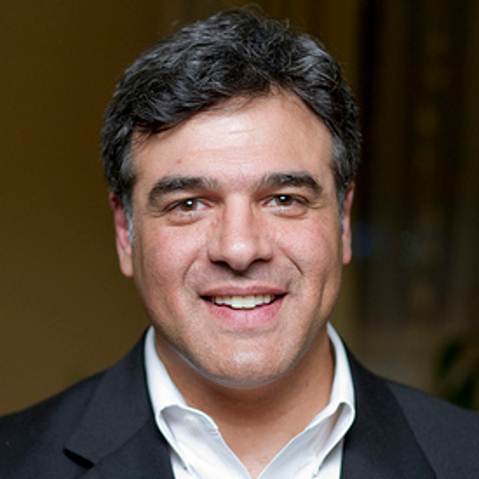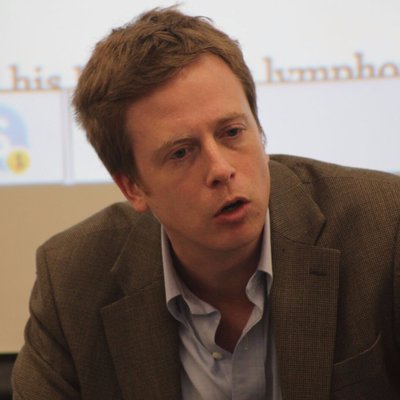The president, in a moment that would later spark international outrage, openly speculated as to why so many more were immigrating from “shithole countries,” according to reports, rather than nations like Norway, which is chiefly white.
When Trump allegedly made the now-infamous racist remark, it’s possible he was ignorant to the fact that Norwegians are appreciably happier about their circumstances than anyone else in the world, and unlikely going out of their way to move to the United States. It’s also quite possible that Trump was unaware that among those particularly content in the Scandinavian country are Norwegian journalists.
Reporters Without Borders (RSF), which advocates for improved press freedoms globally, graded Norway No. 1 out of 180 other countries in its 2017 Press Freedom Index. In its report, it noted that “the media are free and journalists are not subject to censorship or political pressure.”
Meanwhile, in the United States—a nation recognized as a so-called beacon of democracy and civil liberties, where “Freedom of the Press” is literally enshrined as a guaranteed right in the First Amendment—there isn’t even a federal shield law to ensure journalists’ privilege of protecting their sources. In its explanation for ranking the United States at an embarrassing No. 43, below Belize and Burkina Faso, RSF recalled the Obama administration’s unprecedented war on whistleblowers, and also singled out the election of Trump, who after assuming office, branded the media the “Enemy of the American People” and repeatedly invokes “Fake News” when confronted with unflattering news coverage.
As the press’ First Amendment right to practice its craft without government interference comes under repeated waves of attacks, it would take a creative brand of revisionist history to tell this story without considering President Barack Obama’s shortcomings during his two terms in office. While Trump has unflinchingly rebuked the media amid an already tumultuous first term, Obama’s contempt were characterized by an unprecedented war on whistleblowers. These include well-intentioned sources within the government that risked their careers, and freedom, to respectively expose waste, fraud, and abuse inside agencies that vehemently defend secrecy over transparency, whistleblower advocates say. This crusade also included veteran journalists whom the government either subpoenaed to reveal sources, secretly spied on, arrested or harassed at airports.
It was not revealed until last December, for instance, that trailblazing journalist Laura Poitras—the first to be contacted by eventual NSA whistleblower Edward Snowden—had been detained at airports more than 50 times by border agents from 2006 to 2012. The investigations began shortly after Poitras started documenting life inside war-torn countries following the Sept. 11, 2001 attacks, according to the Electronic Frontier Foundation (EFF), a nonprofit that represents Poitras.
“Her treatment is a clear example of the government abusing its vast surveillance power at the border,” EFF said last year. (Poitras earned an Oscar for her documentary Citizenfour, based on the Snowden saga.)
Cases like Poitras’ underscores why press freedom groups have pushed back so zealously against state-sponsored attacks on journalists.
These events paint a portrait of a government’s obsessed with plugging national security leaks, which contributed to the United States’ precipitous drop in RSF’s press freedom ranking since the beginning of the century. When Reporters Without Borders first released the Press Freedom Index in 2002, the United States was still a long way from the top—ranked No. 17. As Obama came into office in 2009, the country was in the 20th position, which represented a 16-spot increase from the prior year, when George W. Bush was still president.
As Obama’s presidency came to a close, however, the country’s ranking plummeted yet again. Obama became known not for improving government transparency, as he had promised on his first day in office, but for prosecuting more whistleblowers under the Espionage Act than all other administrations combined.
As Obama rode a wave of tremendous good will into office following his historic 2008 election, he promised to shake-up government from within.
“The way to make government responsible is to hold it accountable,” he pledged on Jan. 21, 2009, the day following his ballyhooed inauguration. “And the way to make government accountable is to make it transparent so the American people can know exactly what decisions are being made, how they’re being made, and whether their interests are being well-served.”
On the face of it, Obama’s comments were refreshing—the previous administration concealed that it had ran a torture regime, had committed warrant-less spying on American citizens, and were committing alleged human rights abuses in the name of the War on Terror. There was also a case involving Al Jazeera cameraman, Sami al-Hajj, who despite having a valid work visa was captured near the Afghanistan-Pakistan border and detained at Guantanamo Bay for six years without charge.
But like with Obama’s promise to close the Guantanamo Bay detention center in Cuba—which he announced on his second day in office—he fell horribly short. Obama’s Justice Department went to extreme lengths to have New York Times reporter James Risen subpoenaed to reveal his source, spied on reporters for the Associated Press, and named another journalist a co-conspirator as part of a leak case. One reporter even went to federal prison after he was initially charged with sharing a publicly available link containing hacked material about secretive government contractors that revealed, among other things, how some organizations in particular tried to discredit WikiLeaks and Pulitzer Prize-winning journalist Glenn Greenwald.
“What this crackdown on whistleblowers had done is really chilled the investigative journalism space, especially in national security, where sources are now terrified to talk to reporters.”
—Trevor Timm, Freedom of the Press Foundation
Even before the current presidency highlighted Trump’s autocratic tendencies, it was the Obama administration that press freedom groups were likening to the Nixon White House. One veteran White House journalist went so far as to call Obama the “least transparent of the seven presidents I’ve covered.”
It didn’t end there. James Risen, the famed national security reporter behind some of the important post-9/11 stories ever published, called Obama the “greatest enemy of press freedom in a generation.” Risen would know, considering he endured a protracted legal battle because he refused to reveal his source for a chapter in his 2006 book State of War, about a botched CIA operation to sabotage Iran’s nuclear operation.
While no journalist was charged under the Espionage Act under Obama, advocates say even threatening their sources with a World War I-era law intended to prosecute spies ultimately undermines the press’ ability to effectively do its job.
“This really is not ancillary to press freedom rights, it’s directly affecting press freedom rights,” explains Trevor Timm, executive director of the Freedom of the Press Foundation. “The only way that journalists and reporters can get information to the public is if they have sources within the government that can feel safe getting it to them. And what this crackdown on whistleblowers had done is really chilled the investigative journalism space, especially in national security, where sources are now terrified to talk to reporters.”
Curiously, the attacks continued and an apathetic mainstream media carried on as if the First Amendment wasn’t theirs to protect.
SHOOT THE MESSENGER
On the day Trump was inaugurated, dozens of protesters were rounded up on rioting charges. Among those arrested were nine journalists covering the event, including independent journalist Alexi Wood, who was later acquitted of eight felony counts. In May 2017, a Guardian journalist reporting on a contested House race was physically assaulted by the Republican candidate Greg Gianforte, who later went on to win the race. Five months after that incident, a Montana GOP official said she “would have shot” the reporter.
It stands to reason that Trump has emboldened public officials and people outside of government to openly vent their displeasure with the craft of truth-telling. Trump himself has held rallies in which he repeatedly vocally attacks the media, and went as far as retweeting a video in which he’s seen hitting a person whose head had been replaced with CNN’s logo.
Trump revealed deep animosity toward the press during his campaign—but that was merely the start. In his first press conference as president-elect, Trump shouted down CNN reporter Jim Acosta and refused to address his question. He justified it by blasting Acosta, and his employer, as “Fake News.”
The vitriol has since evolved beyond name-calling.
In August 2017, the Freedom of the Press Foundation formally launched a “Press Freedom Tracker,” which it uses to document physical attacks and legal assaults on the media. After 2017, the nonprofit press advocacy organization concluded that there were 34 arrests of journalists in the United States and 44 assaults in only six months. Overall, its researchers counted more than 125 “press freedom incidents,” including a startling number of arrests of reporters simply covering protests—which represented 88 percent of all arrests the organization documented.
“Basically what you have seen over the past two years is journalists who get arrested covering protests, that’s definitely steadily increased this year,” says Margaux Ewen, executive director of Reporters Without Borders’ North America bureau.
She said there’s also issues with journalists being able to simply do their jobs.
“You also have a lot of issues with access to the press to the government, ability to ask questions, or even to gain access or accreditation to specific official events,” she adds, seated inside RSF’s Washington, D.C. office, not far from the White House. “And then more specifically in the last year, repeated media-bashing from the president of the United States and other individuals within his government. And with that, coming more physical harassment or online harassment of journalists, that kind of fulfills that rhetoric that comes out of the White House.”
Trump’s provocations come at a fraught time for the news industry. Newspapers in particular are fighting to remain financially solvent, while at the same time distrust in the media has grown.
Trump is not solely to blame. But that his attacks seem to be timed with less favorability toward the press wouldn’t appear to be coincidental. According to a Politico/Morning Consult poll released last October, 46 percent of Americans, including three-quarters of Republicans, said they believe the media makes up fictitious stories about Trump—which would seem to play into his “Fake News” narrative.
Overall trust in the media has declined steadily over the last few decades—well before Trump became a political force—but during the same period that newspaper circulation has been in decline.
“He really played to that underlying distrust and kind of amplified it,” says Ewen. “So now it’s really a much bigger problem and it needs to be addressed, because the relationship between Trump bashing the press, and the press that kind of pushes back and says ‘No, no, we actually are just doing our job.’ But then their coverage is very aggressive and fact-based, and sometimes, people are portraying that as just being negative coverage all the time.”
Trump, for his part, overtly blasts the media as untrustworthy, whereas Obama’s war on journalism, was, at least on the surface, less-menacing. But that’s because it was waged through the courts, with whistleblowers usually bearing the brunt of an unprecedented crackdown.
FIRST, THEY CAME FOR THE JOURNALISTS
Barrett Brown and John Kiriakou are keenly aware of what it’s like when the full weight of the U.S. justice system bears down on you.
Brown is an award-winning, Texas-based journalist whose stories appeared in such outlets as The Guardian, Vanity Fair and The Huffington Post, among others. His legal troubles began after he created a crowd-sourcing news site called Project PM, which enabled him and others to collaborate on investigative projects, some of which were based on hacked documents. Among the revelations was a plot by a consortium of intelligence contractors, collectively dubbed Team Themis, to discredit whistleblower site WikiLeaks and Greenwald, now the Pulitzer Prize-winning co-founder of The Intercept.
“We learned that they were talking about doing hacks on WikiLeaks, going after WikiLeaks’ donors and harassing them, intimidating them, and going after journalists like Glenn Greenwald, who they identified as integral to WikiLeaks’ support,” Brown told News Beat podcast. “And making [Greenwald] choose ‘career over cause’—as in they would intimidate him and whatever else, until such time that he toed the party line. So a lot of these things were illegal.”
Brown also discovered that government contractors, which proliferated after 9/11, were providing bureaucratic agencies and private corporations with confidential intelligence. His reporting also uncovered mass surveillance being conducted by government contractors on behalf of the U.S. government.
“One of the questions that I get routinely is ‘Why didn’t you go through the chain of command?’ And I’ve already said that my chain of command created the torture program, their bosses ordered and justified the torture program, it didn’t make sense to me.”
—John Kiriakou, CIA whistleblower
Federal investigators conducted a raid on Brown’s apartment and his mother’s home in 2012, and he was arrested six months later. He was initially facing upwards of 100 years in prison for various charges, including for sharing a link that was already public—which various press freedom organizations vehemently condemned.
That prompted the late New York Times journalist David Carr to write a piece headlined: “A Journalist-Agitator Facing Prison Over a Link.”
Brown later pleaded guilty to Internet threats, accessory after the fact, and interfering with the execution of a search warrant; he was sentenced to five years in prison.
In our interview, Brown underscored the significance of the work he and others were doing.
“As far as we can tell, the intelligence contracting agency sort of ballooned after 9/11. There was a lot of opportunities for people to leave their government post or leave the military and make a lot more money providing services to the government via these companies, and that’s what happened,” he said. “You had tons and tons of companies proliferating, and very few people knew about them.
“Prior to the Anonymous hack on HBGary, in 2011, there’s basically one article that’d come up if you’d Google ‘intelligence contracting,’” he continued. “It was a piece by Mother Jones that was very good, sort of estimating how much this has grown. But again, we had very little idea of what they actually did…it opened that bottle. These companies, from what we’ve seen, they’re providing what they would call free-market solutions to the problem of surveillance and of espionage and of propaganda.”
Kiriakou was on the other side of the coin. After 9/11, he became the CIA’s chief of counterterrorism operations in Pakistan, and led an operation that at the time the U.S. government was heralding as its first big intelligence win in the War on Terror. The raids had led to the capture of an alleged al Qaeda facilitator named Abu Zubaydah.
Zubaydah became the Bush administration’s torture guinea pig. Zubaydah, who the United States wrongly assumed was a top al Qaeda official, was transferred to a CIA black site—an unofficial, covert detention center—and was tortured for 19 consecutive days.
During an interview with ABC News reporter Brian Ross in 2007, Kiriakou became the first government official to confirm waterboarding was used on alleged terror suspects. Within 24 hours of that interview, the government had filed a criminal report against him—essentially, the beginnings of an investigation.
Kiriakou was indicted by a grand jury in Alexandria, Va., under the Espionage Act, for revealing the identity of a covert agent and disclosing information to a journalist. Kiriakou, who is married with kids, decided to plead guilty instead of face the potential of a 45-year prison sentence. Although Kiriakou wasn’t charged with confirming that the U.S. government conducted waterboarding on suspects, his attorneys had contended that he was being prosecuted for embarrassing the government.
“One of the questions that I get routinely is ‘Why didn’t you go through the chain of command?’” Kiriakou told News Beat podcast. “And I’ve already said that my chain of command created the torture program, their bosses ordered and justified the torture program, it didn’t make sense to me.”
Brown and Kiriakou, whom were both prosecuted under the Obama administration, have now joined forces as part of a collaborative entity called Pursuance Project that’s similar to Brown’s Project PM site.
Brown, founder of the online anti-injustice civic ecosystem Pursuance Project, said it’ll be a place where crowd-sourced journalism can thrive, while empowering individuals who would not have the institutional support that this system provides. Kiriakou is a member of its board of directors.
Brown sees Pursuance as “eventually becoming something that will be in a position to confront criminalized institutions around the world that thus far have done a great job of consolidating power,” he said. “When you start doing that and you start seeing some initial successes, and when journalists see other journalists experimenting with these crowd-sourced research tools, and institutions see the other NGOs are using this to better take advantage of its supporters, for the people who want to work with these institutions but aren’t allowed to, aren’t giving a framework to. And when you see individuals who right now are frustrated, all they can do is retweet something, or you know, scream into the ether on Facebook, and you give them…opportunities to put research or copyrighting or design or coding into the play of a dynamic entity that is using these things, or things that they believe in, then you’re going to see an extraordinarily different kind of world.”
REALITY
The Trump administration has picked up where Obama left off as it strives to come down hard on leak cases. Attorney General Jeff Sessions in November testified before the House Judiciary Committee that leak investigations had increased 800 percent in his first year on the job.
According to Sessions, from the time the Trump administration came into office and the date of his testimony, the Justice Department had opened 27 leak investigations, as compared to three the previous year.
ACLU attorney Ben Wizner expressed shock with this figure in an interview with The Daily Beast.
“In the whole history of the country, there have only been about a dozen prosecutions for leaks,” Wizner said. “So the 27 number, if it’s real, is staggering.”
One such probe led to the arrest of Reality Winner, an NSA contractor, who the government alleges leaked classified information to the investigative news outlet The Intercept about a Russian cyber attack targeting a supplier of U.S. voting software.
Winner faces up to a decade in federal prison on charges that she allegedly violated the Espionage Act. Prosecutors have claimed that Winner admitted the leak, but statements she made to her FBI interrogators early in the investigation are currently under scrutiny.
The use of the Espionage Act is consistent with how the Obama administration used the nearly century-old law to prosecute government leakers.
When whistleblowers faced lengthy prison sentences during Obama’s two terms, one of the chief complaints from press freedom organizations was that the media as a whole was providing inadequate coverage—if any at all.
Chelsea Manning, one of the most infamous whistleblowers in modern history, whose leaks of tens of thousands of cables and confidential documents to this day help journalists add context to evolving geopolitical issues, became an afterthought following her arrest. Only a handful of journalists covered the daily proceedings during her military court martial, with only major media players dipping in for consequential events, such as Manning’s guilty plea on some of the charges against her.
The Freedom of the Press Foundation’s Timm laments the same thing may be happening to Winner, who is being held in jail without bail.
“Unfortunately, Reality Winner has been a little bit forgotten about in the media, especially just because Trump manages to create a new controversy every day,” Timm said. “Yet she is being prosecuted under the Espionage Act, the same law that is used to charge spies, even though it was her alleged intent to inform the public.”
Despite the changes to journalism this century alone, including attacks on the press by the government, Timm stresses the many privileges the U.S. press enjoys that are not afforded to their colleagues in other parts of the world.
“I think press freedom in the United States is really complicated. On one hand, the First Amendment is still alive and fairly well, which means that newspapers do have the freedom to basically publish what they want without being censored, which is a very important thing that we shouldn’t forget,” Timm said.
“But at the same time, the government attacks them from all sorts of different angles, not related to the actual publishing,” he continued. “So they’ll go after the leakers or the whistleblowers and the sources, they’ll conduct surveillance on journalists, in some cases, they’ll even subpoena them to force them to testify, or try to force them to testify, like in the James Risen case. And now we’re seeing with Trump this kind of daily barrage of insults that he’s throwing at the press to try to delegitimize what they report about him, so no one will believe it.”
“So these are certainly attacks on the general principles of press freedom, and are very concerning, especially over the long run, where these newspapers, especially with them financially hurting, can be kind of run into the ground by this constant legal and public pressure that they face from government officials. While I think that it’s in many ways, the U.S. still has the most vibrant and free press in the world, there are many ways where these rights are being eroded, and it’s important for the public to be aware that these rights are not just for journalists, they’re for everyone. We receive information through these journalists as a conduit. It is a really important safety valve for democracy that we don’t want to lose.”











